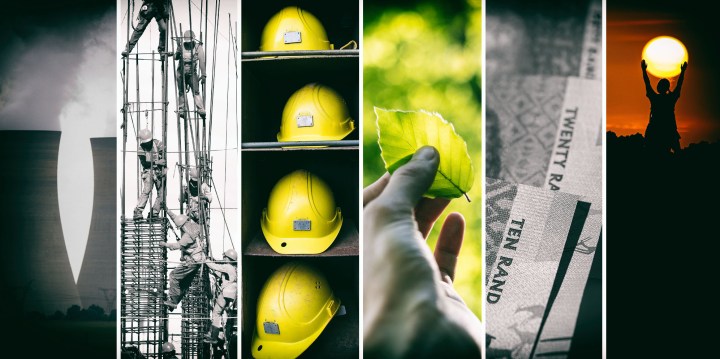ECO-SOCIALISM OP-ED
Democratising a ‘just transition’ in South Africa

A move to a low-carbon future for South Africa could help to create a more equal society in the country — but if mismanaged it could have dire consequences for those who can afford it least.
When the concept of a just transition was introduced to South Africa by Cosatu, it was grounded in people’s lived experiences and aspirations; it was at the heart of a powerful narrative of hope for a better life.
The Mapungubwe Institute for Strategic Reflection’s (Mistra’s) forthcoming book on a low-carbon future for South Africa suggests that there is a basis for cooperation between labour and the new organisational initiatives around climate justice emerging in civil society, based on labour’s commitment to measures such as job protection, environment-friendly investment, comprehensive social security for displaced workers and skills development.
Chapter 9 of Mistra’s book (co-authored by the writers of this article) aims to contribute to “democratising” the concept of a just transition, which we take to mean deep, transformative change that benefits the majority of our people. The chapter demonstrates how the concept of a just transition — as a revolutionary idea containing the possibility of radical change for a more equal society — has been appropriated. Powerful social forces have stripped away much of this transformative content.
The chapter describes how these social forces, particularly coal mining corporations, form a set of constraints on achieving a just transition. At the same time, new social forces are emerging from civil society to address the climate crisis and to promote the concept of climate justice. The chapter suggests that the Cosatu Policy Framework document of 2012 provides a basis on which the labour movement could mobilise different forms of power to address unemployment, poverty and inequality, as well as climate change.
It provides the basis for a democratic, eco-socialist alternative future. The process of “democratisation” is necessary because in the present cacophony of voices addressing a just transition, those most affected, namely coal workers and people living in mining-affected communities, are seldom heard. It concludes that a just transition must be driven from below in an alliance led by labour.
Insights from labour on a just transition
Long before the Paris Agreement, Cosatu warned about climate change and advocated for a just transition to ensure that workers and communities were not left behind in the move to a low-carbon economy.
The 2009 Cosatu Congress resolution stated that: “Climate change is one of the greatest threats to our planet and our people.” The congress further noted that: “Unless the working class and its organisations take climate change seriously, all the talk about ‘green jobs’ will amount to nothing except being another site of capitalist accumulation.”
These warnings about climate change were a precursor to cooperation between labour and civil society. This collaboration was evident in the labour/civil society conference held in 2010. More than 300 delegates from civil society organisations represented millions of South Africans; they committed to rebuilding a strong mass democratic movement around critical problems that confront workers and communities and agreed to the concept of a social justice charter.
While the initiatives in civil society are fragmented and the concept of a just transition is contested, there are grounds for a convergence of interests, especially between labour and environmental justice activists. However, this convergence is not straightforward.
Elements in the environmental movement have reduced the concept of a just transition to mean a shift to a new energy regime. For some, this could even take the form of privatised renewable energy, which is not labour-intensive and is likely to mean higher energy prices that are not in the interests of the working class.
The labour movement is not against renewables, but is increasingly adamant that the state’s privatised renewable energy policy poses a threat as it will involve job losses and increased energy prices. After all, private corporations prioritise profit maximisation above the need to meet social needs. Labour, particularly Numsa, has called for publicly owned and democratically controlled renewable energy largely made up of state-owned entities and community cooperatives.
The environmental movement is increasingly adamant about the immediate closure of coal mines and coal-fired power stations. A shift to renewable energy (in whatever form) is essential to a just transition, but does not always acknowledge that a deep just transition requires changes in the sources of energy, and also changes in who owns and controls various components of the energy system. Recently, animosities have surfaced on this issue.
Labour’s conceptual framing of the just transition, as articulated in the Cosatu climate change policy document, can provide a basis for a mass coalition of the broader social movement. The issues unions have been fighting for and building are the same issues that will strengthen us to deal with climate change and usher in a just transition. However, if capitalism continues in its current form, then there will be no future.
The goal of a just transition is sometimes described as a form of a “green capitalism” dependent on expanding markets and new technology, or as a “green economy”. But commentators have pointed out that these notions of the just transition effectively obscure any alternatives or make them seem not viable.
Eco-socialism is a viable alternative if it includes concrete examples of cooperative work and communal ownership of productive resources. For many people, socialism is discredited because its claims have been marred by a history of authoritarianism, productivism, human rights abuses and environmental destruction. But we are arguing for a new democratic, ecological and ethical socialism. The aim of the struggle for socialism is, in the first instance, to replace a society based on profit with one based on satisfying the needs of people.
New social forms involve reciprocity, solidarity and cooperation emerging around these ideas, and they embody fragments of a vision of an alternative post-capitalist future. They also imply a new narrative of relations with nature, grounded in the acknowledgement that humans exist as part of an ecological community. This involves new social relations with people, which bolster trust, cooperation and reciprocity. An alliance between labour and the progressive elements in civil society could generate solidarity to achieve this future. DM/OBP
Lebogang Mulaisi is a labour market policy coordinator for Cosatu. She is an Exco and Manco member at Nedlac and represents organised labour in the labour market chamber of Nedlac. She is also a commissioner on the Presidential Climate Change Coordinating Commission.
Jacklyn Cock is Professor Emeritus in the Department of Sociology at the University of the Witwatersrand where she is also Research Professor in the Sociology of Work Unit.
[hearken id=”daily-maverick/9194″]




















 Become an Insider
Become an Insider
The planet is facing an existential crisis. The slogan “no-one left behind” should be a moral and political imperative. For the South African fossil fuel sector (including power stations), a quick transition in which all fossil fuel workers’ salaries and pensions would be guaranteed, would increase to about R35 billion per year by 2032, then start decreasing. This is totally possible. This is what a red/green alliance would need.